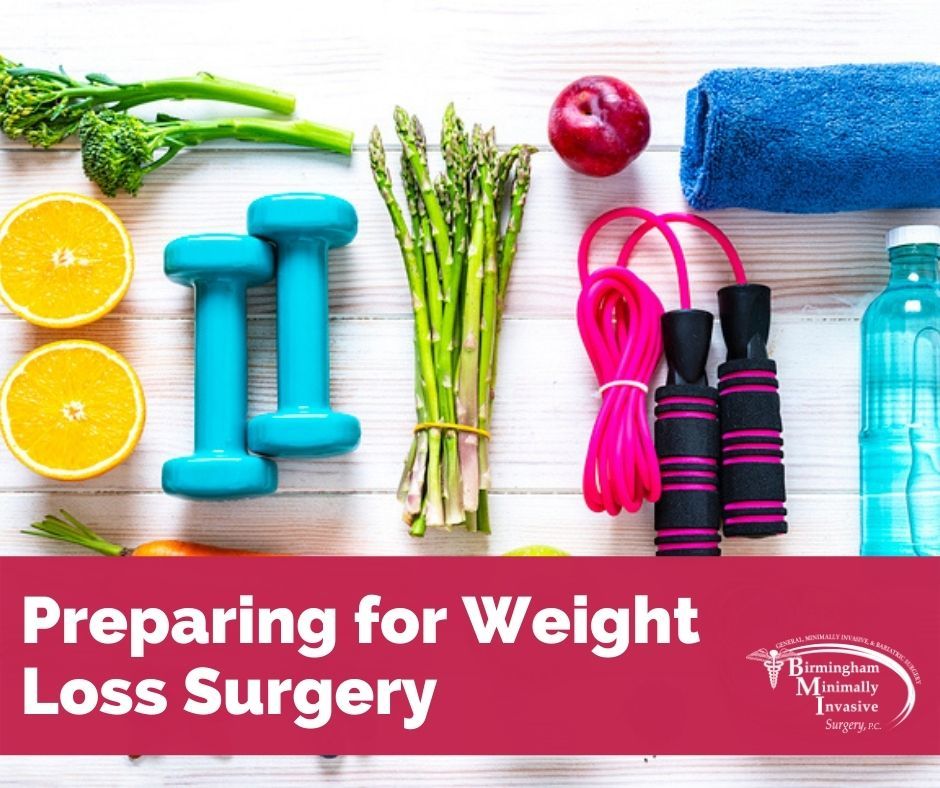
Once the decision has been made to have weight loss surgery, many of our patients at Birmingham Minimally Invasive focus primarily on the surgery itself and what life will be like after. But there are actually many things to think about regarding life before surgery happens.
Preparing for weight-loss surgery begins several months in advance. Once our surgeon, Dr. Jay Long, has determined that you are a good candidate for options such as gastric sleeve or gastric bypass surgery, we’ll start working with you on all the details to get you ready.
Preparing for Weight Loss Surgery
Weight loss surgery is a great tool to help you lose weight and get healthier. It’s not a miracle cure though, and it does take work and preparation. The more you mentally prepare and make lifestyle changes before surgery, the easier the transition will be and the better you can hit the ground running with your weight-loss.
Here are some typical things you’ll need to do as you prepare for your surgery, but remember that each of our patients has an individualized plan. Your plan may look slightly different depending on your unique situation.
Truly consider why you eat. Many people who are obese eat for reasons other than hunger. Maybe it’s stress, boredom, habit, emotion, mental health conditions, or other reasons. While surgery will change how much you can eat at one time, it won’t change these mental health factors. Figuring out why you overeat and making changes to improve those habits before surgery will be extremely beneficial after surgery. This may require working with a therapist or attending a support group.
Talk to your health insurance provider about your coverage. Many insurance companies do cover at least a portion of weight loss surgery, but they may have special requirements you must follow. Find out the details on this as soon as possible so that your surgery doesn’t have to be delayed.
Practice eating on a schedule. After surgery, you’ll need to eat a protein based meal every three to four hours. If you’re not eating this way now, the transition to multiple mini-meals a day can be hard. Map out a schedule of when and what to eat. Food prep is the key that helps many people stay on track. Bring snacks, balanced meals, and water with you wherever you go if you’ll be out and about when it’s time for a meal.
Eat like you’ve already had surgery. Mini meals may work well as mentioned above, but it’s also important to get used to eating slowly and chewing very thoroughly. Read more about what you’ll be able to eat and when in this article.
Make a plan for holidays, parties, and social events. You may be surprised to find out how much food plays a role in your social life and your overall lifestyle. Most likely, this will need to change to some extent. Start to identify changes that will need to occur and communicate early on with friends and family members.
Treat your water bottle like it’s your best friend. Dehydration is one of the biggest post-op complications. You won’t be able to drink large amounts of fluid at one time, and you won’t be drinking during meals. Instead, you will drink at non-meal times so that you can fit in enough protein and other vitamins and nutrients. This is a big change, so practicing before surgery will be very helpful.
Begin a regular exercise program. You don’t get to have weight loss surgery because you don’t want to work out. Regular, long-term exercise is a huge part of being successful with weight loss after surgery. Finding exercise options that you enjoy before you have surgery will help you have a plan that you can look forward to after surgery.
Follow our recommended pre-surgery diet. We will help you make a plan for a special diet you will need to follow before surgery. This pre-op diet is geared toward reducing the amount of fat in and around your liver to reduce the risk of complications during surgery. Your new eating plan may begin as soon as you are cleared for the procedure.
Guidelines are individualized for each patient and surgery type, but may include the following:
- Eliminating or decreasing saturated fats, such as whole milk products, fatty meat, and fried food
- Eliminating or decreasing foods that are high in carbohydrates, such as sugary desserts, pasta, potatoes, and bread
- Eliminating high-sugar beverages, such as juice and sodas
- Practicing portion control
- Avoiding binge eating
- Quitting smoking
- Avoiding alcoholic beverages and recreational drugs
- Not drinking beverages with meals
- Taking a daily multivitamin
- Taking protein supplements
Contact Birmingham Minimally Invasive Surgery to Get Started on Your Weight Loss Journey
While we will require some of these preparations such as the pre-surgery diet, many of them are up to you. You will get out of it what you put into it, and this is true even before surgery. The more you prepare, the more you’ll be ready mentally and physically for the weight loss journey you’re about to begin.
Learn more about weight loss options at Birmingham Minimally Invasive Surgery.
The caring group of professionals at Birmingham Minimally Invasive Surgery will help you get started on your weight loss journey and stay with you every step along the way. Dr. Long and his team specialize in all types of bariatric surgery, including gastric sleeve surgery, gastric bypass, and the LAP-BAND. Visit us today at http://www.bmisurgery.com/ or give us a call to set up a consultation at 205-833-6907.

